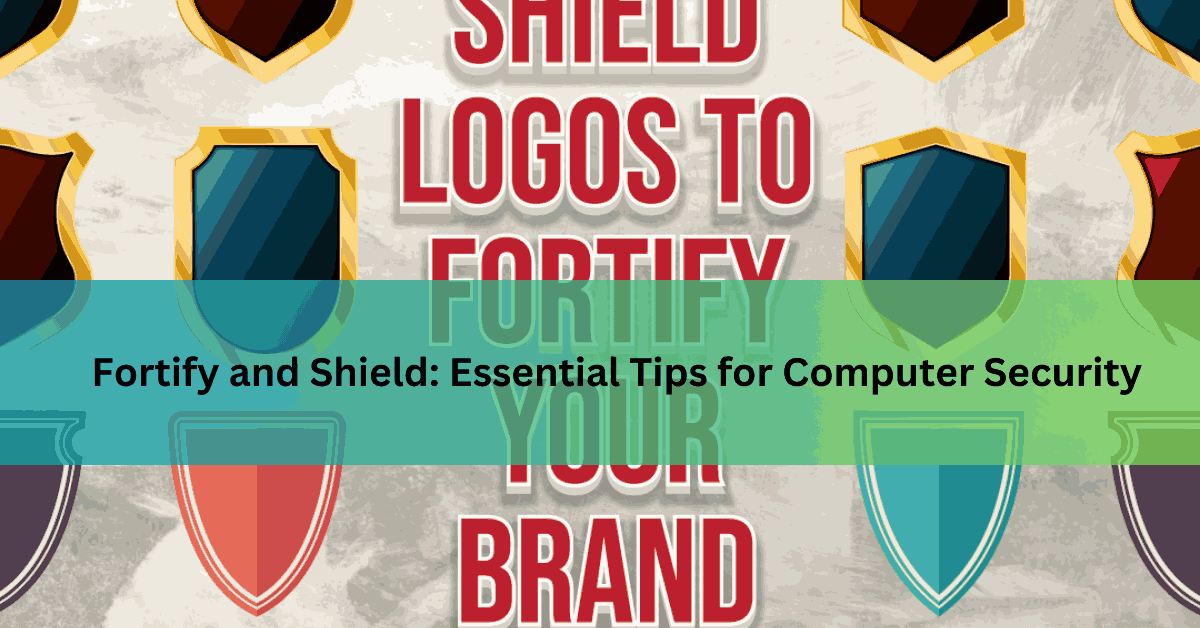Fortify and Shield: Essential Tips for Computer Security
In today’s digital age, protecting our personal information and data has become more important than ever. With the rise of cyber-attacks and data breaches, it is crucial to fortify and shield our computers from potential threats.
In this blog post, we will discuss some essential tips for computer security that can help keep your personal information safe and secure.
Keep Your Software Up to Date
One of the easiest ways to fortify your computer’s security is by keeping all software up to date. This includes operating systems, antivirus programs, web browsers, and other applications you may have installed.
Software updates often include important security patches that can fix vulnerabilities and protect against potential attacks. Make sure to regularly check for updates and install them as soon as they are available.
Use Strong and Unique Passwords
Passwords are the first line of defense against hackers trying to access your personal information. It is important to use strong passwords that are difficult for others to guess or crack. This means avoiding simple and easily guessable combinations like “password” or “123456”.
Instead, use a combination of letters, numbers, and special characters to create a strong password. It is also important to use unique passwords for each of your accounts, as using the same password for multiple accounts puts all of them at risk if one account gets compromised.
Enable Two-Factor Authentication
Two-factor authentication (2FA) adds an extra layer of security to your online accounts. With 2FA, you will need to provide a second form of identification, such as a code sent to your phone or email, in addition to your password. This helps prevent unauthorized access even if someone manages to guess or obtain your password.
Be Wary of Suspicious Emails and Links
Phishing scams are a common tactic used by hackers to steal personal information. These scams often come in the form of emails or links that appear to be from legitimate sources but are fake and designed to trick you into giving away sensitive information.
Be cautious of any emails or links asking for personal information, and never click on suspicious links or attachments. It is always best to directly go to a website by typing in the URL yourself instead of clicking on a link.
Backup Your Data Regularly
Even with all the necessary precautions in place, it is still possible for your computer to be compromised. This is why it is important to regularly back up your data.
In case of a cyber-attack or system failure, having a backup of your important files and documents can save you from losing them permanently. Consider using an external hard drive or cloud storage for backups.
Use a Firewall
A firewall is a security measure that acts as a barrier between your computer and the internet, filtering out potentially harmful traffic. It helps block unauthorized access to your computer and can prevent malicious software from entering your system.
Most operating systems have built-in firewalls, but you can also use third-party firewalls for added security.
Avoid Using Public Wi-Fi
Public Wi-Fi networks are convenient, but they can also be a security risk. These open networks make it easier for hackers to intercept your internet traffic and gain access to your personal information.
If you must use public Wi-Fi, consider using a virtual private network (VPN) to encrypt your data and protect against potential threats.
Be Mindful of Social Media Privacy Settings
Social media platforms are a common target for hackers looking to gather personal information. Make sure to review and adjust your privacy settings on social media to limit who can see your posts, photos, and other personal details.
It is also important to be cautious about the information you share online, as even seemingly harmless details like your birthday or address can be used by hackers to access your accounts.
Educate Yourself and Stay Informed
The world of computer security is constantly evolving, so it is important to educate yourself and stay informed about the latest threats and best practices. Keep an eye out for news about data breaches or new cyber attacks, and regularly review your security measures to ensure they are up to date.
It is also helpful to follow reputable security blogs and websites for updates and tips on how to stay safe online.
In Conclusion
As we come to the end of this discussion, it’s clear that ensuring your computer’s security is vital. With the constant threat of cyber-attacks and breaches in today’s digital world, it’s crucial to implement essential tips that will better protect your personal information and data.
Make sure to update your software regularly, use strong and unique passwords, enable two-factor authentication, be cautious of suspicious emails and links, back up your data regularly, use a firewall, avoid public Wi-Fi, adjust social media privacy settings, and stay informed about the latest security best practices.
But what if you don’t have the skills or knowledge to set up these security protocols? Don’t worry; you can always consult a professional in computer repair in Salt Lake City to help fortify and shield your computer against potential threats. Let’s all work together to make the Internet a safer place for everyone.









